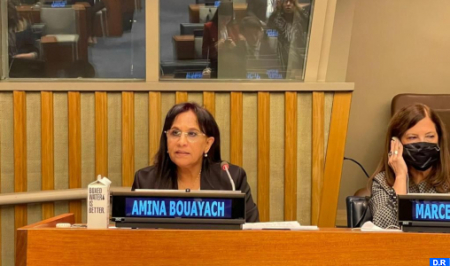CNDH President Highlights Role of Human Rights Institutions in Migration
National Human Rights Council (CNDH) President Amina Bouayach highlighted, on Wednesday in New York, the role of national human rights institutions (NHRIs) in providing access to information on migration. “NHRIs’ role has evolved. They have become both providers and transmitters of information, including through direct contact with migrants and civil society,” said Bouayach at a round-table discussion held as part of the 1st Forum to review the implementation of the Global Compact for Safe, Orderly and Regular Migration, known as the Marrakech Compact. Bouayach, who is participating in this conclave in her capacity as Chair of the Network of African National Human Rights Institutions (NANHRI) Working Group on Migration and Vice-Chair of the Global Alliance of National Human Rights Institutions (GANHRI), recalled that NHRIs have spared no effort to promote access to fair and law-based information during the COVID-19 pandemic. “Their good practices have been shared through a platform created by our Global Alliance of NHRIs, called FUSE”, she said during this round-table discussion co-chaired by the Ambassador Permanent Representative of Morocco to the UN, Omar Hilale and the Head of the State Migration Service of the Republic of Azerbaijan, Vusal Huseynov. She also noted that the CNDH has organized campaigns in different African languages, including Lingala and Wolof, to accompany migrants, facing the threat of COVID-19, while initiating advocacy and consultations with the media community for the dissemination of institutional information on migration. Reiterating the commitment of African NHRIs to actively interact with the various international and regional mechanisms, and in particular the African Migration Observatory, the President of the CNDH also expressed the concern of NHRIs regarding the “dissemination of false information hindering safe, orderly and regular migration, feeding on the vulnerabilities of certain populations.” African NHRIs “note a lack of predictability of information circulating due to the constant and abrupt changes in policies and laws relating to migration,” she said, noting that this is “inconsistent” with the Marrakech Pact’s Goal 3. Bouayach also noted that relevant, accurate and adequate information on migration, in its various aspects, whether legislative, social, economic but also political and cultural, as well as on reception mechanisms and access procedures, are crucial data for the protection of migrants, especially against the risks of exploitation, abuse and labor. “The availability and access to information for migrants are not only technical tools, but must be designed as tools for prevention against exploitation, tools for protection against violations and promotion of the right of access to information,” she said. Recalling the “major” role of NHRIs, especially at the time of hearings and direct reception of migrants and to provide answers to the requests of migrants, she stressed the importance of establishing, or strengthening where appropriate, “effective, independent and pluralistic” NHRIs “with a broad mandate and adequate resources.” Bouayach also considered it essential to take into consideration climate challenges, insisting at the same time on the need to take up the emerging challenge of digitization to prevent xenophobic speeches and protect migrants from acts of racism and discrimination in all their forms.

